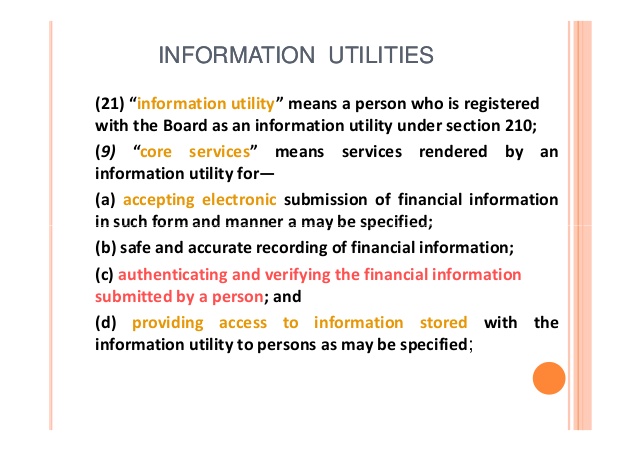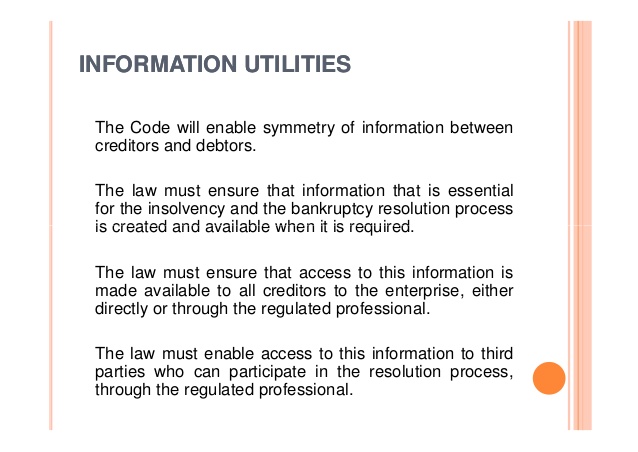INFORMATION UTILITY UNDER INSOLVENCY
& BANKRUPTCY CODE 2016
Last month, National
e-Governance Services Ltd (NeSL) became India’s first information utility (IU)
for bankruptcy cases under the Insolvency and Bankruptcy Code 2016. NeSL is
owned by State Bank of India and Life Insurance Corporation Ltd., among others.
Recently, the Insolvency and Bankruptcy Board of India (IBBI) eased ownership
norms for setting up such utilities.
WHAT IS AN INFORMATION UTILITY?
Information utility is
an information network which would store financial data like borrowings,
default and security interests among others of firms. The utility would
specialise in procuring, maintaining and providing/supplying financial
information to businesses, financial institutions, adjudicating authority,
insolvency professionals and other relevant stake holders.
WHY IS IT
IMPORTANT? HOW USEFUL IS IT?
The objective behind
information utilities is to provide high-quality, authenticated information
about debts and defaults, as per the report of the Working Group on Information
Utility published by the Ministry of Corporate Affairs. Information utilities
are expected to play a key role as they allow storage of financial information
of registered users and expeditiously process and verify information received.
Moreover, the database and records maintained by them would help lenders in
taking informed decisions about credit transactions. It would also make debtors
cautious as credit information is available with the utility. More importantly,
information available with the utility can be used as evidence in bankruptcy cases
before the National Company Law Tribunal.
WHAT ARE THE
RULES GOVERNING THESE UTILITIES?
Information utilities
are governed by the Insolvency and Bankruptcy code 2016 and IBBI (Information
Utilities) Regulations 2017. The Insolvency and Bankruptcy Board of India
(IBBI) overseas aspects such as registration and cancellation of these
entities, their shareholding and governance among others. Recently, IBBI eased
norms for information utilities, allowing Indian firms listed on stock
exchanges to hold 100% in such firms. It also allowed individuals to hold 51%
in the utility for a period of three years
HOW WILL THE
UTILITIES HELP STAKEHOLDERS IN THE INSOLVENCY PROCESS?
MANDATORY FOR FINANCIAL CREDITORS
Financial creditors
(banks which provide loans to the company): It is mandatory for financial
creditors to provide financial information to the information utility. When
they initiate insolvency proceedings against the defaulting firm (known as
corporate debtor), the utilities may help as they would act as a centralised
platform for accessing data.
OPTIONAL FOR OPERATIONAL CREDITORS
Operational Creditor
(Suppliers of goods and services to the firm in question): Unlike financial
creditors, it is optional for the operational creditor to provide financial
information to the utility. While the idea behind information utility is to
have a financial data repository, it has to be seen to what extent firms
provide data with regard to dues owed to operational creditors and how the
utility is going to help the operational creditors during insolvency process.
WHAT ARE THE
KEY CHALLENGES FOR THESE UTILITIES?
While the onus is on
financial creditors, operational creditors and corporate debtors to provide the
required information, procuring authentic information might be a challenge due
to the sensitivity involved. There may also, be resistance in sharing
information. Since it is a digital database, there is the risk of exposure to
data piracy and data theft.
Courtesy: Mr. Sanjay
Vijayakumar, The Hindu




No comments:
Post a Comment